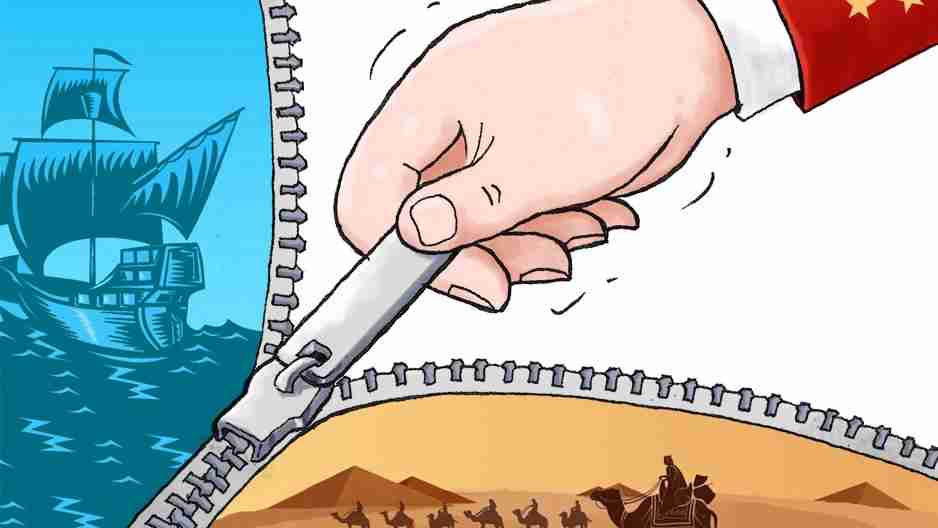


China’s Belt and Road (B&R) initiative will help developing countries so that their voices are heard in the global arena, as well as rebalance the Western-dominated world economy, said experts.
The remarks were made during the International Forum for the Development of Countries along the Belt and Road, held by Chinese Academy of Social Sciences on June 26, with experts from 17 countries along the B&R sharing their opinions on the importance of the initiative in global economic governance.
The accumulated investment of Chinese enterprises in B&R countries is $18 billion. Such figures show a promising future for the B&R countries’ economic development, and once they rise, the Western-led unipolar order will turn into a more balanced, multipolar one, said Salman Azam Joiya, a teaching fellow at the University of Management and Technology in Lahore, Pakistan.
Echoing Salman, Wei Ling, a professor at China Foreign Affairs University, said the B&R has provided new opportunities for global economic cooperation, as well as a counterbalance for the negative effects of the globalization.
“Many developing countries have become the world’s fastest-growing economies since the 2008 financial crisis, and they will continue boosting the world’s economy. As a new global economic governance plan featuring the core value of establishing a community of common destiny, the B&R has gained support from those countries,” said Wei.
First announced in 2013 by Chinese President Xi Jinping, the B&R aims to connect Asia, Europe, and the Middle East and Africa with a vast logistics and transportation network, involving over 60 countries and affecting one-third of global GDP and more than half of the world’s population.
China leads in global economic governance
In his opening address, Wang Jingqing, vice president of the CASS, welcomed foreign scholars.
Unlike other platforms for global economic governance, such as the TPP and FTAs, the B&R features an unprecedented openness that welcomes every nation of the world without discrimination or exclusion, which has made China a leader in global economic governance, said experts.
China’s peaceful rise has made it a representative for the B&R countries, helping the latter tap into the global economic market. For instance, current IMF quotas are normally deemed as incapable of reflecting economic realities. China urged the IMF on several occasions in 2017 to increase quota resources and review the distribution of quotas and votes to ensure a fair reflection of emerging and developing economies.
“From time to time, China has shown the world its capacity in turning vision to consensus and turning constructive proposals into reality. Seeing the success in China-proposed platforms, the world will surely have more confidence in and higher expectations for China’s role in improving global economic governance,” said Salman.
“As a rising leader in global economic governance, China’s edge over the U.S. is its economic diplomacy. Rather than bring wars and conflicts to other regions, economic diplomacy will benefit other countries. The more we are connected, the more cooperation, the less complexity,” said Nazia Malik, assistant professor at the National University of Sciences and Technology in Pakistan.
A new platform
According to the experts, new theories and strategies should be created to guide the initiative’s development in a direction that benefits all the participating nations, in order to secure B&R’s position as a major platform for global economic governance.
“People have been wondering if China can rise peacefully and if B&R is beneficial for other nations,” said Esmaeil Maghami, a research fellow at the Institute for Political and International Studies in Iran. He then added: “I think a new perspective is needed to understand the rise of China, as well as the essence of B&R.”
Esmaeli noted that new theories and strategies, especially in the social sciences, should be made to ensure the initiative runs smoothly, while people-to-people exchanges between China and B&R countries should be encouraged to provide intellectual support.
Sanket Sudhir Kulkarni, a research fellow at the Observer Research Foundation in Mumbai, India, suggested that the diversified needs of participating countries should be considered equally and thoroughly when it comes to the initiative's rule-making process.
“Countries like Bangladesh and Myanmar have great potential for industrial construction, while for nations like Indonesia, the priority lies in the development of clean energy, such as bio-fuel. By borrowing experience from existing economic structures, we should establish a financial architecture that is much more sustainable and compatible, said Kulkarni.
 Fire brigade in Shanghai holds group wedding
Fire brigade in Shanghai holds group wedding Tourists enjoy ice sculptures in Datan Town, north China
Tourists enjoy ice sculptures in Datan Town, north China Sunset scenery of Dayan Pagoda in Xi'an
Sunset scenery of Dayan Pagoda in Xi'an Tourists have fun at scenic spot in Nanlong Town, NW China
Tourists have fun at scenic spot in Nanlong Town, NW China Harbin attracts tourists by making best use of ice in winter
Harbin attracts tourists by making best use of ice in winter In pics: FIS Alpine Ski Women's World Cup Slalom
In pics: FIS Alpine Ski Women's World Cup Slalom Black-necked cranes rest at reservoir in Lhunzhub County, Lhasa
Black-necked cranes rest at reservoir in Lhunzhub County, Lhasa China's FAST telescope will be available to foreign scientists in April
China's FAST telescope will be available to foreign scientists in April "She power" plays indispensable role in poverty alleviation
"She power" plays indispensable role in poverty alleviation Top 10 world news events of People's Daily in 2020
Top 10 world news events of People's Daily in 2020 Top 10 China news events of People's Daily in 2020
Top 10 China news events of People's Daily in 2020 Top 10 media buzzwords of 2020
Top 10 media buzzwords of 2020 Year-ender:10 major tourism stories of 2020
Year-ender:10 major tourism stories of 2020 No interference in Venezuelan issues
No interference in Venezuelan issues
 Biz prepares for trade spat
Biz prepares for trade spat
 Broadcasting Continent
Broadcasting Continent Australia wins Chinese CEOs as US loses
Australia wins Chinese CEOs as US loses